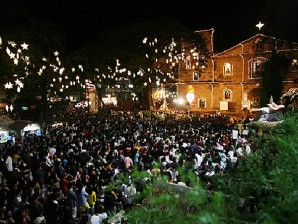
CHRISTMAS TRADITION. A traditional Filipino Christmas or Paskong Pinoy is the nine-day dawn masses that start on December 16 and end on Christmas Day. INQUIRER FILE PHOTO
MANILA, Philippines – On the eve of the first day of “Simbang Gabi,” the nine-day series of pre-dawn Masses, a Catholic bishop and an environmental group urged Filipinos to go for “an ecological and simple celebration” of Christmas.
Caloocan Bishop Deogracias Iñiguez Jr. and the EcoWaste Coalition on Saturday pleaded for an “eco simple” feast in the wake of the devastation of Typhoon “Pablo,” which affected more than 5.7 million people and left 955 dead and 841 still missing.
“An ‘eco simple’ observance of Christmas will be sensitive to the heartbreaking sufferings of typhoon-stricken families in the affected areas of Mindanao and the need for environmental stewardship now more than ever,” said Iñiguez, chairman of the Public Affairs Committee of the Catholic Bishops’ Conference of the Philippines.
“The simplicity of the manger should inspire us all to be somber and charitable in these difficult times,” he added.
Edwin Alejo, EcoWaste Coalition coordinator, said observing an “eco simple” Christmas could save funds that could be used “to beef up relief and rehabilitation efforts, while helping restore damaged ecosystems through resource conservation, pollution prevention and zero waste.”
He said some “eco simple” suggestions include calling off lavish Christmas parties, canceling fireworks displays, abandoning plans to light up firecrackers, moderating shopping expenses and reusing or recycling holiday decorations.
Filipinos could also opt for an austere Noche Buena and Media Noche celebrations, the shelving of out-of-town, out-of-country holidays and shortening the use of Christmas lights.
One tangible benefit of this will be the reduction of holiday trash, or “holitrash,” resulting from the unrestrained consumption and disposal during the extended festivities, the EcoWaste Coalition pointed out.
Daily waste generation, especially in highly urbanized areas like Metro Manila, swells with increased consumption of goods and services due to the holiday fever, the group noted.
According to the National Solid Waste Management Commission, Metro Manila produces some 8,000 tons of garbage daily, which is over 22 percent of the nationwide daily waste generation of 35,430 tons.
Of the 8,000 tons of garbage from Metro Manila’s 17 local government units, 50 percent are reportedly food and organic discards, plastics (25 percent), paper (12 percent), metals (five percent), glass (three percent), hazardous waste (one percent) and residual waste (four percent), EcoWaste said.
“With ‘eco simple’ Christmas, we promote ecological values leading to a cut in the volume and toxicity of what we throw away,” it added.